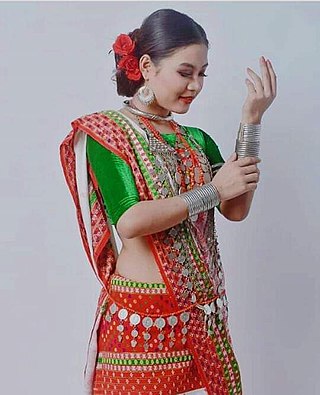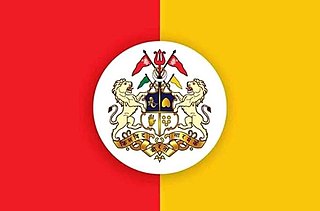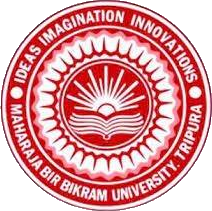
Agartala is the capital and the largest city of the Indian state of Tripura, situated on the banks of Hoara River, about 2 kilometres (1.2 mi) east of the border with Bangladesh and about 2,499 km (1,52 mi) from the National Capital New Delhi. According to 2022 census, Agartala is the third-most populous city in Northeast India with a population of about 5.7 lakh. It is India's third international internet gateway and being developed under the Smart Cities Mission.

Maharaja Bir Bikram Kishore Manikya Airport, also known as AgartalaAirport, is a domestic airport situated 12 kilometres northwest of Agartala, the capital of Tripura. It is administered by the Airports Authority of India (AAI). It is the second busiest airport in North-East India after Lokpriya Gopinath Bordoloi Airport in Guwahati and 29th busiest airport in India. It is the third international airport in North-East India, after Lokpriya Gopinath Bordoloi Airport and Imphal Airport. The new current integrated terminal of the airport has 20 check-in counters, six parking bays, four aerobridges, conveyor belts and passenger-friendly modern facilities and amenities like In-Line Baggage System (ILBS), Escalators, Lifts, etc. In addition to the new terminal building, a new parallel taxiway to the runway and two new hangars are being built. Another terminal, along with the runway, will be built as an extension of the airport across the border with Bangladesh. This new terminal will serve Bangladeshis accessing the airport without having to enter Indian territory. This arrangement is worked out as similar to the Cross Border Xpress terminal of Tijuana International Airport in Mexico, which is located along the United States–Mexico border.

Maharaja Bir Bikram College or MBB College is a degree college of the Indian state of Tripura, imparting general education in the streams of Science, Commerce and Humanities. Established in 1947, it is the oldest college in the state of Tripura with a campus spread over 264 acres (107 ha). It is located approximately 3 km (1.9 mi) from the city center. The motto of the college is "Vidayamrtamasnute". The college is named after former Maharaja of Tripura State, Bir Bikram Manikya Bahadur.

The Tripuri, are a Tibeto-Burmese ethnic group of Northeast Indian state of Tripura. They are the inhabitants of the Twipra/Tripura Kingdom in North-East India and Bangladesh. The Tripuri people through the Manikya dynasty ruled the Kingdom of Tripura for many years until the kingdom joined the Indian Union on 15 October 1949.

Tripura

The Manikya dynasty was the ruling house of the Twipra Kingdom and later the princely Tripura State, what is now the Indian state of Tripura. Ruling since the early 15th century, the dynasty at its height controlled a large swathe of the north-east of the Indian subcontinent. After coming under British influence, in 1761 they transitioned from feudal monarchs into rulers of a princely state, though the Manikyas maintain control of the region until 1949, when it ascended in union with India.
Maharaja Bir Bikram Kishore Manikya Debbarma Bahadur was a king of Tripura State.

Kirit Pradyot Manikya Deb Barma Bahadur is the current head of the Tripuri royal family and is the titular king. He was born in New Delhi, and now resides in Agartala, Tripura. He also served as the editor of TNT-The Northeast Today. He is the current chairman of The Indigenous Progressive Regional Alliance also known as TIPRA Motha. He is known as 'Bubagra' among his people and is one of the active voices for the rights of Indigenous Tripuri people of Tripura.
Mahamanyabar Rajkumar Srila-Srijukta Nabadwipchandra Dev Burman, also transliterated as Nabadwip Chandra Deb Barman, was a noted Indian sitarist and Dhrupad singer. He was the father of composer S. D. Burman and grandfather of another composer R. D. Burman.
Tripuri Kshatriya is a Vaishnav caste group which encompasses almost all the members of the Tripuri, Reang, Jamatia and Noatia ethnic groups, most of whom live in the Indian state of Tripura. The Tripuri Royal Family belonged to the Tripuri ethnic group, from the Debbarma clan. Originally the term "Tripur Kshatriya" was used to denote the Tripuri ethnic group only, but in due time, the Maharajah included the remaining three ethnic groups as well, in an attempt to foster a sense of kinship among his people. With the influx of the Bengali immigrants from neighboring places, the Tripuris lost their majority in their own kingdom and the Maharajah's power was taken away by the Indian government. Formerly, the community was organized under the Tripura Kshatriya Samaj, which was headed by the Maharajah of Tripura himself.

Maharani Kanchan Prava Devi was a Queen of Tripura as the wife of Bir Bikram Kishore Debbarma, King of Tripura State. After her husband's death in 1947, she was regent of Tripura until it was merged with India in 1949.

Tripura State, also known as Hill Tipperah, was a princely state in India during the period of the British Raj and for some two years after the departure of the British. Its rulers belonged to the Manikya dynasty and until August 1947 the state was in a subsidiary alliance, from which it was released by the Indian Independence Act 1947. The state acceded to the newly independent Indian Union on 13 August 1947, and subsequently merged into the Indian Union in October 1949.
Barman or its variants Burman, Varman, , Varma, Verma, are surnames used in the Indian subcontinent.

Maharaja Bir Bikram University is a state university located at Agartala, Tripura, India. It is the first, and as of 2023, the only state university in the state of Tripura. The university is named after Bir Bikram Kishore Debbarman, the last ruling maharaja of the princely state of Tripura.
Bibhu Kumari Devi is the current head of the Royal Family of Tripura, Indian National Congress politician and former member of the 10th Lok Sabha.
Maharaja Kirit Bikram Kishore Manikya Deb Barma Bahadur was the 185th and last King of Tripura, a princely state in northeastern India. His formal coronation was held in 1941, but he never gained the powers of a king.

The Tipra Motha Party (TMP), also known as the Tipraha Indigenous Progressive Regional Alliance, is a regional political party and previously a social organization in Tripura, India. The TIPRA is led by Pradyot Bikram Manikya Deb Barma. It is currently the largest opposition party in Tripura Legislative Assembly










